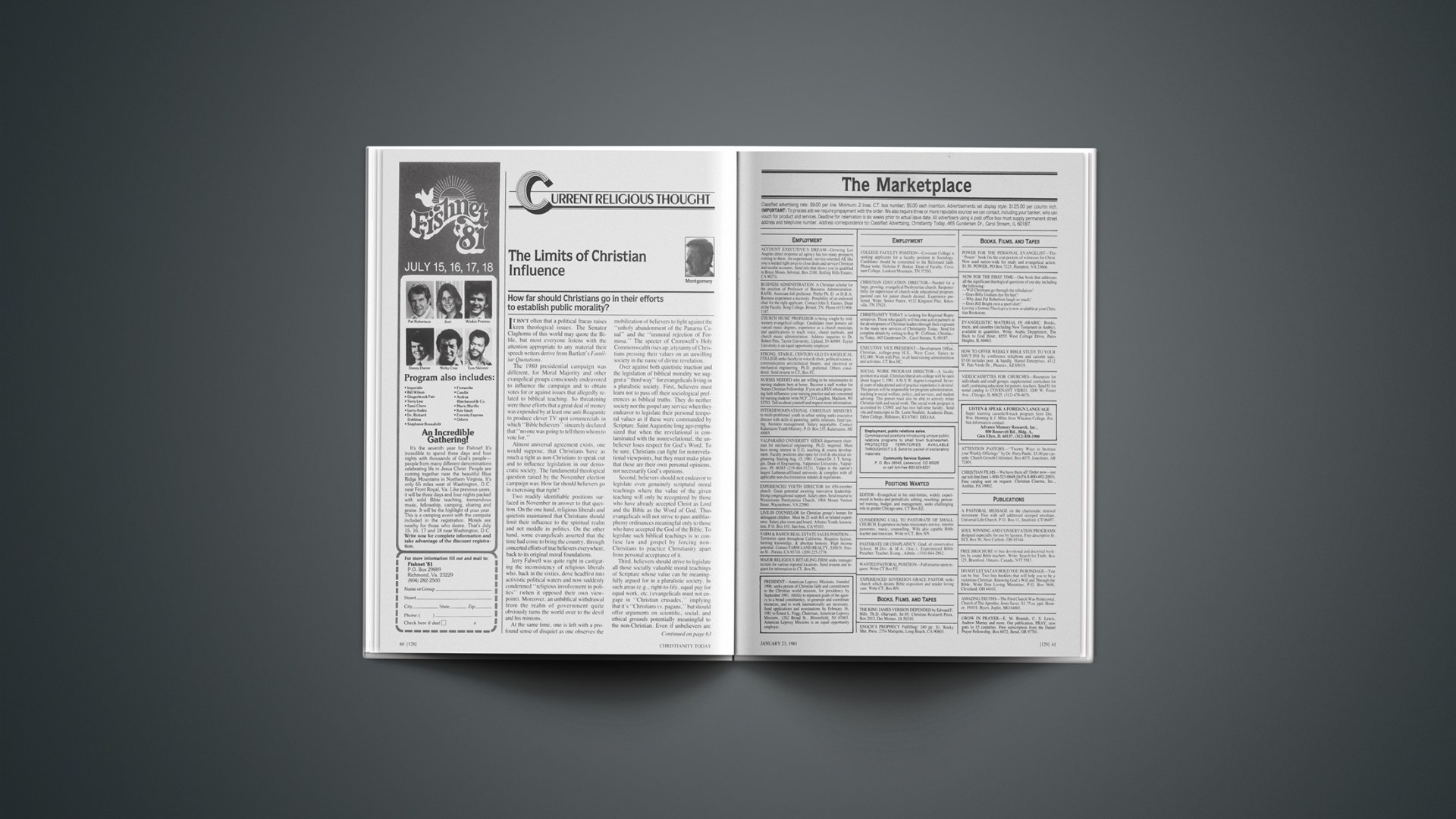How far should Christians go in their efforts to establish public morality?
It isn’t often that a political fracas raises keen theological issues. The Senator Claghorns of this world may quote the Bible, but most everyone listens with the attention appropriate to any material their speech writers derive from Bartlett’s Familiar Quotations.
The 1980 presidential campaign was different, for Moral Majority and other evangelical groups consciously endeavored to influence the campaign and to obtain votes for or against issues that allegedly related to biblical teaching. So threatening were these efforts that a great deal of money was expended by at least one anti-Reaganite to produce clever TV spot commercials in which “Bible believers” sincerely declared that “no one was going to tell them whom to vote for.”
Almost universal agreement exists, one would suppose, that Christians have as much a right as non-Christians to speak out and to influence legislation in our democratic society. The fundamental theological question raised by the November election campaign was: How far should believers go in exercising that right?
Two readily identifiable positions surfaced in November in answer to that question. On the one hand, religious liberals and quietists maintained that Christians should limit their influence to the spiritual realm and not meddle in politics. On the other hand, some evangelicals asserted that the time had come to bring the country, through concerted efforts of true believers everywhere, back to its original moral foundations.
Jerry Falwell was quite right in castigating the inconsistency of religious liberals who, back in the sixties, dove headfirst into activistic political waters and now suddenly condemned “religious involvement in politics” (when it opposed their own viewpoint). Moreover, an unbiblical withdrawal from the realm of government quite obviously turns the world over to the devil and his minions.
At the same time, one is left with a profound sense of disquiet as one observes the mobilization of believers to fight against the “unholy abandonment of the Panama Canal” and the “immoral rejection of Formosa.” The specter of Cromwell’s Holy Commonwealth rises up: a tyranny of Christians pressing their values on an unwilling society in the name of divine revelation.
Over against both quietistic inaction and the legislation of biblical morality we suggest a “third way” for evangelicals living in a pluralistic society. First, believers must learn not to pass off their sociological preferences as biblical truths. They do neither society nor the gospel any service when they endeavor to legislate their personal temporal values as if these were commanded by Scripture. Saint Augustine long ago emphasized that when the revelational is contaminated with the nonrevelational, the unbeliever loses respect for God’s Word. To be sure, Christians can fight for nonrevelational viewpoints, but they must make plain that these are their own personal opinions, not necessarily God’s opinions.
Second, believers should not endeavor to legislate even genuinely scriptural moral teachings where the value of the given teaching will only be recognized by those who have already accepted Christ as Lord and the Bible as the Word of God. Thus evangelicals will not strive to pass antiblasphemy ordinances meaningful only to those who have accepted the God of the Bible. To legislate such biblical teachings is to confuse law and gospel by forcing non-Christians to practice Christianity apart from personal acceptance of it.
Third, believers should strive to legislate all those socially valuable moral teachings of Scripture whose value can be meaningfully argued for in a pluralistic society. In such areas (e.g., right-to-life, equal pay for equal work, etc.) evangelicals must not engage in “Christian crusades,” implying that it’s “Christians vs. pagans,” but should offer arguments on scientific, social, and ethical grounds potentially meaningful to the non-Christian. Even if unbelievers are not convinced, they can see that Christians are making their case on grounds which they themselves must confess to be legitimate in a pluralistic society. Then even though believers vote en bloc and pass the legislation, the non-Christian has no right to claim that an alien religion is being imposed on him.
In a word, though we are indeed to try to bring our secular society into greater conformity with God’s moral ideals, that is not our primary task. Gospel preachment comes first, and if we must choose—as occasionally we must in a fallen world—between moral betterment and non-Christians willing to listen to the gospel from those who offer it freely, without compulsion, we will need to choose the latter. Our goal in a secular society is not to force the society, come what may, into the framework of God’s kingdom, but rather to bring it as close as we can to divine standards consistent with effective gospel preachment to those for whom Christ died.
JOHN WARWICK MONTGOMERY1An attorney-theologian, Dr. Montgomery is dean of the Simon Greenleaf School of Law, Costa Mesa, California, and director of studies at the International Institute of Human Rights, Strasbourg, France.










